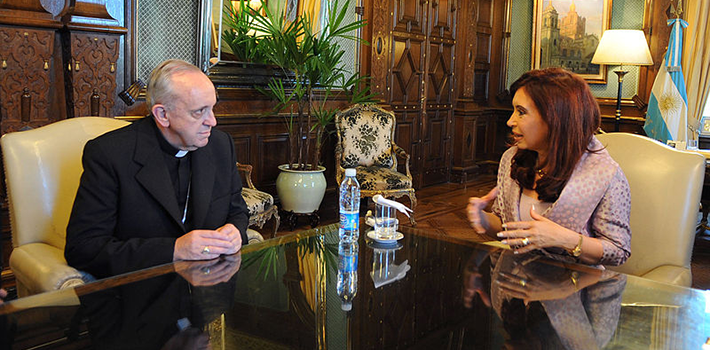EspañolMost Argentineans remember where they were or what they were doing when the new pope was announced. In my case, I was reading Noticia de un secuestro (News of a Kidnapping) in a small pub near Avenida de Mayo in Buenos Aires. I drank bitter coffee while listening to the television in the background. I remember hearing applause throughout the entire room when they finally made the announcement on March 13, 2013: the new pope was an Argentinean.
Following the resignation of Benedict XVI, Jorge Mario Bergoglio — self-proclaimed Pope Francis — became the head of the Vatican, the Roman Catholic Church, and one of the most influential figures worldwide. His popularity grew rapidly throughout the world, as well as in Argentina. Before long, he went from being a loyal figure in the opposition, to one widely respected by the official government in Argentina.

The political romance with the government of Argentina came and went several times, but the reality is that the first person the new pope granted an audience to was Cristina Fernandez de Kirchner. To date, the two have met together on three separate occasions, the last time on March 17. According to Spanish newspaper ABC, the appointment was requested by Pope Francis, who suggested a lunch together. The newspaper reported that the meeting was held so that the pope could express his concern over Argentina’s social situation and promote dialogue between differing political sectors.
However, the Vatican’s official version was that the meeting was held to “present the Holy Father with a greeting, congratulations, and warm sentiments from the people of Argentina upon completing his first year as pope.” It’s curious, to say the least, that the two went from an icy relationship while he was Cardinal of Buenos Aires to warm hugs and phone calls.
On Thursday, the program Alas8, a 20-minute weekday show funded by its audience and hosted by José Benegas and Roberto Cachanosky — two journalists with extensive experience in Argentina — interviewed Jorge Giacobbe, director of the prestigious consulting firm, Giacobbe & Asociados Public Opinion.
During the show, Giacobbe condemned the close relationship between Pope Francis and President Kirchner, and the undeniable influence the pope has in setting the political and governmental agenda in the South American nation. According to Giacobbe, the pope is actively involved in the country’s politics, and argues that he has played a key role in keeping Kirchner in power. In the video (starting at minute 18:40), the consultant stresses that “the government and the pope agreed that she (Kirchner) should not go, not until 2015.”
When Robert Cachanosky asked Giacobbe why the pope intervenes in these matters, he responded: “The pope acts on internal orders from the church — the most political church in the world — that’s always been involved in politics. Bergolio has always been involved in Argentina’s politics, and now as pope, his popularity has grown, he doesn’t want the place he grew up in to fall apart. So, he’s involved, and since November, he’s intervened to achieve social order. Intervened strongly.”
What Bergoglio Negotiated with Cristina?
In the words of Giacobbe, the pope negotiated several terms:
First, it was agreed that Kirchner would step aside, “but not out.” Kirchner must stop “leading the public media engagement in response to conflicts, but not step down from government.”
The pope also negotiated for the chief of staff to function as prime minister. Julián Dominguez was their first pick, he said, but then came Jorge Capitanich, because Kirchner asked for it it be someone from the Kichnerista core. “Capitanich remains to handle complaints, and they will negotiate a peaceful end to the media law.”
Giacobbe also says the pope “asked the government to put an end to drug trafficking. This, the government has not yet been able to accomplish. Tension remains with what the pope requested.”
Giacobbe contends that the Argentinean government cannot do anything to put a stop to drug trafficking, because they are themselves involved.
“Drug cartels cannot ascend to this level in Argentina without everyone being dirty, the narcos, the politicians, and the justice system. Narcos are not installed without the endorsement of all these forces.”
On the other hand, Rosendo Fraga — a lawyer, journalist, political analyst and historian — has another opinion on what is occurring between Francis and Kirchner. She believes Francis is out of Argentina’s politics, since declaring in an interview, “The pope not longer thinks about Argentina.”
Unlike the position held by Giacobbe, Fraga contends the enthusiasm over Francis is mostly driven by his popularity. She says, “some suggest that the pope slipped [influence] into politics by, for example, joining the opposition and unions, or in the document signed by the government to fight drugs. In reality, this is a result of everyone wanting to be near the pope and have their picture taken. But when there is a concrete suggestion, enthusiasm goes down.”
“We should not have expectations that the pope could, in the short term, generate significant effects on policy in Argentina,” Fraga concluded.
What then is really happening? Is the pope shuffling future political movements in Argentina, as those in power wish to make him appear — a figure who appears every time Kirchner needs to augment her approval rating, now somewhere around 27 percent? What’s really going on behind the scenes at the Vatican? That is the million dollar question.
 Versión Español
Versión Español












